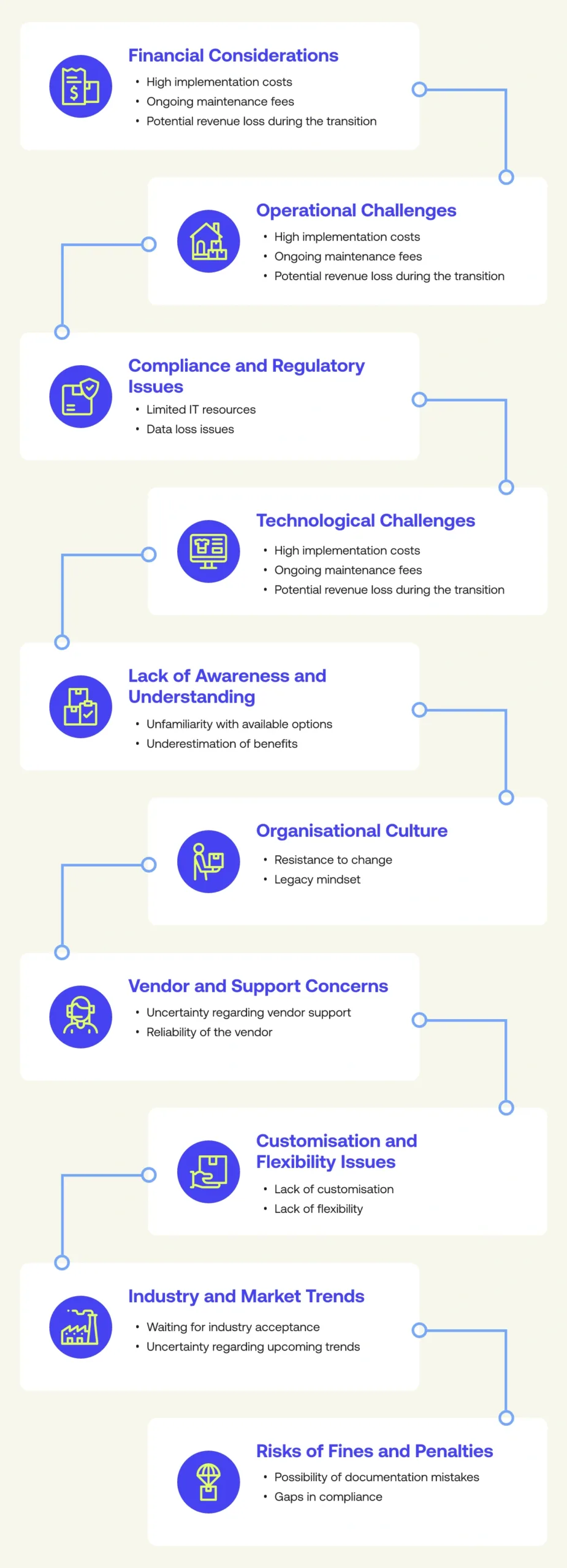Fast & Accurate ENS GB & EU ICS2 Solutions Built for You.
10 Reasons Why Freight Forwarders Hesitate to Change Customs Software
-
Freya Jane
- Director of Customer's Success
Why don’t freight forwarder companies update their customs software? In a sector where efficiency and compliance are essential, businesses should eagerly adopt the new opportunity. However, the truth is much more complicated. Many freight forwarders are reluctant to make the transition, even if it offers the prospect of improved efficiency and reduced procedures. Why? The decision to change can be intimidating despite its apparent simplicity due to a number of issues, from concerns about data security and compliance to the fear of costly disruptions.
One major factor restricting the adoption of new technology is the global economic landscape. The global market is becoming unpredictable, which is shown by research,
“The global market contracted in 2023 by 1.3% and will expand slightly in 2024.”
Due to economic uncertainties, businesses are now cautious and reluctant to invest in new systems. This reluctance is especially noticeable in the freight forwarding sector, as many businesses are still attempting to overcome the difficulties presented by outdated technology.
The legacy systems are usually inefficient, prone to errors, and incapable of integrating with modern technology. Due to a mix of technological and economic constraints, goods forwarders are finding it challenging to justify the expense and inconvenience of updating their systems.
In this blog, we’ll explore ten reasons why freight forwarders don’t migrate to the new software, and discuss how modern software can improve their operations.
Reasons why freight forwarders hesitate to change customs software
Changing customs software can be a significant undertaking for freight forwarders. Here are 10 potential reasons why they might be hesitant:

1. Financial considerations
High implementation costs
New customs software implementations frequently necessitate a substantial upfront expenditure. The initial investment in new software and consulting fees can add up rapidly. This initial cost load can be a major barrier for many freight forwarders, particularly smaller ones.
Ongoing maintenance fees
Once the software is up and running, continuing maintenance costs may further strain budgets. These payments cover the regular updates, support services, and potential troubleshooting necessary to maintain the software’s functionality. These ongoing expenses may make the shift less appealing for businesses with narrow profit margins.
Expenses for staff training
Another significant cost is training staff members to use the new system. Effective training is essential to guarantee that the team can fully utilise the program. However, because workers must be removed from their regular responsibilities to train on the new system, this procedure is time-consuming and costly and may adversely affect productivity.
Possible revenue loss during shifting
Freight forwarders may face temporary disruptions while shifting from an old system to new software. During this period, they may encounter mistakes, which could result in a loss of income. Businesses are typically reluctant to adapt because they fear these short-term losses more than they see the long-term advantages.
2. Operational challenges
When it comes to updating customs software, operational challenges can be just as difficult as financial ones. These challenges can disrupt daily activities and complicate the transition process, making many businesses hesitant to make the switch.
Problems with integration
The integration of new customs software with current systems must be seamless, including:
- Accounting
- Inventory control
- Supply chain management tools
Resistance to change
Typically, employees are used to the current system and may resist shifting to a new one. This resistance may result from a desire for the comfort of the old system, a fear of the unknown, or a reluctance to learn new procedures. To overcome this resistance, it might be challenging to implement both rigorous change management and excellent communication.
Error risk
Human mistakes are more likely to occur during the changeover period. Employees may make mistakes in data entry, processing, and reporting as they get used to the new system.
These mistakes may result in serious repercussions, such as:
- Shipping delays
- False customs statements
- Fines
3. Compliance and regulatory issues
For freight forwarders, managing customs compliance and regulatory requirements is a major concern. These issues can make updating customs software especially daunting, as even minor errors can have serious consequences.
Fear of non-compliance
Customs regulations are intricate and dynamic. To avoid fines, freight forwarders must ensure that their software conforms to the most recent regulations. The danger of non-compliance arises when software is changed since the new system might not be completely compliant with the laws as they stand. For many businesses, this fear of non-compliance is a major barrier.
The complexity of customs laws
Maintaining knowledge of the constantly evolving world of customs laws is difficult. Freight forwarders must ensure that any new software they evaluate can manage this complexity well. Their hesitation is heightened by worries that the new system can only handle some regulatory obligations.
Data security issues
Customs software handles sensitive data, such as bank records, cargo details, and client information. It is critical to safeguard this data from hacks and breaches, which could result from the company’s vulnerability to the new software. One compelling argument for continuing with the current system is the concern over data security breaches.
4. Risks of fines and penalties
When updating customs software, freight forwarders must account for the possibility of fines and penalties. These risks can have significant financial and operational repercussions.
Possibility of documentation mistakes
Inaccurate or missing information on shipping documents may arise from user mistakes during the transfer to a new system. These errors may lead to delays, fines, or penalties. Inaccurate or partial filings may arise from mistakes made by users during the transfer to a new system or from software bugs in the customs documentation. These errors may result in fines, penalties, and shipment delays, all of which could be expensive for goods forwarders.
Gaps in compliance
Freight forwarders risk unintentionally breaking customs laws if the new software doesn’t meet certain regulatory criteria or has gaps in its compliance capabilities. This non-compliance may result in serious financial fines and harm to the company’s reputation.

Worried about export compliance and potential delays?
Reduce the risk of penalties and ensure seamless clearance with iCustoms!
5. Technological challenges
When it comes to software updates, freight forwarders can face significant technological challenges. These challenges frequently necessitate specialised knowledge and resources, which not all businesses possess.
Limited IT resources
Not every freight forwarder has the internal IT knowledge required to oversee a software update. Smaller businesses might not be able to deal with the challenges of integration, deployment, and continuing support. Because of this restriction, they are more likely to put off or avoid upgrading to new customs software.
Data loss issues
For freight forwarders, the possibility of losing important data during the shifting process is a major concern. Data loss may result from unanticipated problems, human error, or technical malfunctions, which can have disastrous effects on a company. Despite its shortcomings, businesses frequently decide to stick with their current software because of this risk.
6. Lack of awareness and understanding
A lack of understanding of modern customs software solutions can significantly impede freight forwarders’ decision-making. This gap in understanding often leads to missed opportunities for improvement.
Unfamiliarity with available options
The newest customs software solutions on the market are often unknown to freight forwarders. They could not recognise the possible advantages of transferring to a new system without sufficient knowledge about the available options.
Underestimation of benefits
Despite being aware of new software choices, freight forwarders might not fully appreciate the advantages of switching. They could not see the full potential of increased efficiency, lower costs, and better compliance. This undervaluation increases their unwillingness to move.
7. Organisational culture
A company’s culture can have a significant impact on decisions to update technology. Established practices of a company frequently influence how new initiatives are approached.
Resistance to change
Businesses frequently naturally oppose change, particularly concerning anything as essential as customs software. Even when a change may ultimately be advantageous, management and employees may hesitate to disturb the established routine. It will take a coordinated effort to overcome this reluctance, which many businesses are unwilling to make.
Legacy mindset
A legacy mindset is the inclination to stick with tried-and-true procedures and frameworks. This refers to using the existing customs software system despite its age because it has proven to be effective in the past. Adopting new technologies may be significantly hampered by this mindset.
8. Issues with vendors and support
Vendor concerns can have a significant impact on a freight forwarder’s reluctance to update customs software. A smooth transition requires reliable support and vendor stability.
Uncertainty regarding vendor support
The degree of assistance offered by the vendor is an important factor to consider while implementing new customs software. Particularly during the transition phase, freight forwarders must know they can count on the vendor to provide prompt and efficient service. Businesses may be reluctant to migrate if they have doubts about the calibre of this help.
Reliability of the vendor
Other crucial elements are the software vendor’s lifespan and stability. Businesses can be concerned that the vendor would fail to supply the required upgrades and support, discontinue the product, or go out of business.
9. Issues with flexibility and customisation
When it comes to new customs software, freight forwarders prioritise flexibility and customisation. Upgrading a system is frequently affected by concerns about how well it will adapt to specific business needs.
Lack of customisation
Custom software solutions are typically necessary to meet the unique business needs of freight forwarders. These needs might not be fully satisfied by the new customs software if it does not provide enough customisation options. This lack of adaptability may be a big turnoff for businesses, who may worry that the new system won’t meet their unique operational needs.
Lack of flexibility
Even if the software does provide some customisation, it may not be versatile enough to fit all of a company’s operations. Because they require a system that can grow with their company, goods forwarders may be reluctant to transition to new software because they believe it will be too inflexible.
10. Industry and market trends
When it comes to selecting new customs software, industry and market trends have a significant impact on freight forwarders’ decisions. These trends can have an impact on how businesses perceive the timing and risks associated with technological upgrades.
Waiting for industry acceptance
Before making the changeover themselves, many freight forwarders would rather wait until the sector has extensively embraced a new technology. They can avoid being early adopters, who frequently face more risks and obstacles, by taking the “wait and see” attitude.
Uncertainty regarding upcoming trends
As the logistics sector is always changing, freight forwarders who are uncertain about the industry’s direction could be reluctant to invest in new customs software. A reluctance to invest in a system that can soon become outdated can lead to an opt-out of the existing system.
Bottom line
At iCustoms, we offer thorough training and support to reduce disturbances during the shift and help your workforce adjust swiftly. With iCustoms, you can improve security, flexibility, and efficiency, ensuring that your operations remain competitive in the constantly changing logistics market.
You may also like:

Tired of Dealing with Outdated Technology?
Experience the benefits of modern customs software with iCustoms.
Automate Your Customs Process
Reduce Paperwork, Improve Accuracy & Enhance Customs Compliance
Subscribe to our Newsletter
About iCustoms
Automate Your Customs Process
Reduce Paperwork, Improve Accuracy & Enhance Customs Compliance

